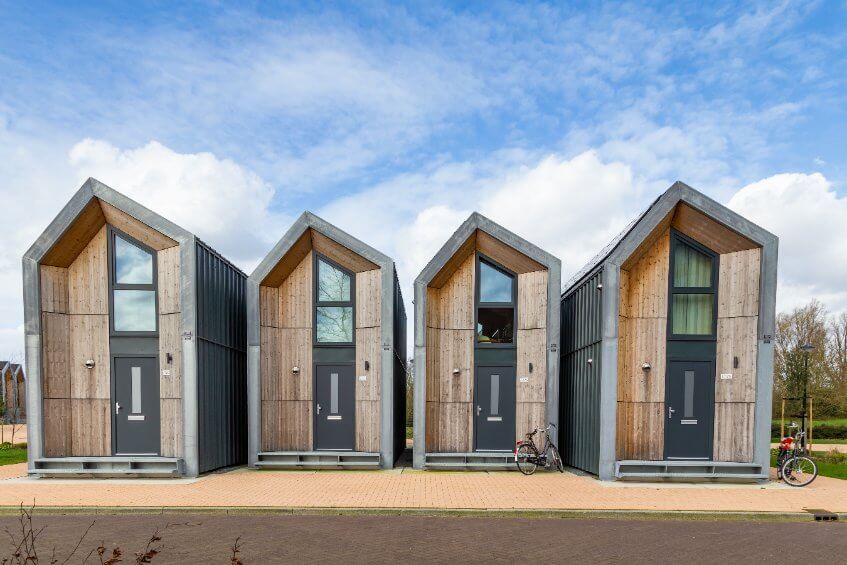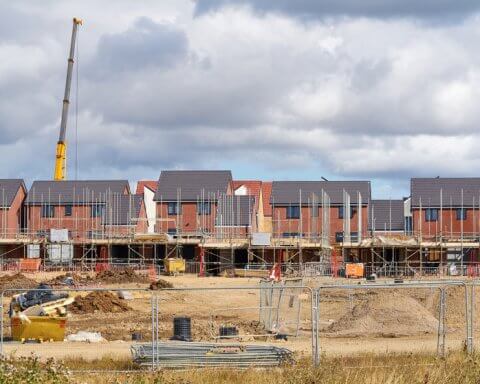Guy Dauncey is the author of Journey to the Future: A Better World Is Possible.
Canada’s housing crisis is causing distress for millions of people who are struggling to find affordable places to rent. It’s causing trouble for business owners, too. In Qualicum Beach, B.C., the town’s most popular restaurant – Lefty’s – had to close in 2022 because its staff couldn’t find anywhere to live nearby. In some of Canada’s cities, employees have to spend two to three hours a day commuting from the closest place there’s a home they can afford.
The long-term solutions are clear: end exclusive single-family zoning; massively expand the rental housing supply, with special emphasis on public and non-profit housing and cooperatives; and tax land wealth. But all this takes time. What can governments do now, to produce rapid results?
- Protect and encourage mobile homes
Every local government could upgrade its bylaws to cease being so restrictive when it comes to mobile homes. Let tiny homes have wheels. Let them have sleeping lofts. Let them have composting toilets. Allow people living in RVs to park places other than official RV parks. Instruct your bylaw officers not to ticket or evict people living in unapproved suites and dwellings, as they are doing on Salt Spring Island, at least until the housing crisis eases. Allow mobile homes on private property, as Oregon has done, as long as they follow health and safety standards. Make permitting quick and easy. Let them be clustered in villages, as Victoria has done. Allow colleges to create them for students. Municipalities should write tiny-homes village zoning bylaws, enabling landowners to apply to rezone. We should also urge governments to pass legislation to prevent profit-driven private equity funds from buying mobile home parks and increasing the rents and fees.
- Restrict short-term vacation rentals
Shall we rent our second home to a permanent tenant, or earn more by turning it into a short-term vacation rental unit? In too many places, owners have chosen the latter. In Greater Victoria, where the vacancy rate for an affordable two-bedroom unit is a miserable 0.2%, causing massive distress, Vrbo boasts of having more than a thousand units for rent, while Airbnb has hundreds more. Across Canada, Vrbo offers 32,460 vacation rentals. Toronto and 10 U.S. cities have passed laws banning or restricting short-term rentals. In B.C., the City of Victoria and Salt Spring and Galiano islands have stopped allowing short-term rentals in secondary properties. Sechelt has decided to cap the number at 15, out of a possible 250. In Vancouver, when short-term rentals were limited to a person’s home and required a licence, listings fell by 50%. In Ontario, condo boards have been given the right to ban short-term rentals. These controls could be lifted once the local rental vacancy rate hits 3%.
- Impose a speculation and vacancy tax
In 2017, Vancouver introduced an Empty Homes Tax, which now stands at 5% of a property’s assessed taxable value. By 2019 it had led to a 26% reduction in vacant properties and encouraged 5,920 condo owners to offer their units for rent. By 2021, it had raised $86 million for investment in affordable housing. In 2019, the B.C. government introduced a separate speculation and vacancy tax in various regions, which encouraged 20,000 condo owners to rent their units out instead of leaving them empty. It has also generated $231 million that is being used to build affordable housing, 86% of which came from non-B.C. residents. Foreign owners of vacant homes in a designated area must pay 2% of their property’s assessed value annually; B.C. owners pay 0.5%. Beginning in 2023, Ottawa and Toronto will introduce a 1% vacancy tax.
- Allow secondary suites in most homes
It’s an obvious way to create more rental housing, but too often an application takes months to wind its way to approval. Oak Bay, on Vancouver Island, now allows secondary suites without need for parking. To speed up permitting, Quesnel has pre-approved five designs for suites. Toronto allows such suites in townhouses, detached homes and duplexes. Local councils should allow homeowners to have both a boarder and a secondary suite, and up to six unrelated people in a home. To encourage homeowners, the federal government should create a 10-year tax-free allowance on the income from renting a secondary suite.
- Buy motels
In 2020, during the early days of the COVID-19 pandemic, Canada’s federal government earmarked $1 billion to help cities and housing providers to buy hotels and motels to keep people from becoming homeless, enabling BC Housing to buy several hotels. In California, 120 sites, mostly hotels and motels, were converted into 5,900 affordable homes for low-income renters and people who were previously homeless. It has to be done carefully, for when motels are used to shelter people who were previously unhoused there are sometimes reports of property damage, theft, drug use, and abusive behaviour toward staff. It’s a quick solution, if it’s done right.
- Protect tenants from eviction
The best way to stop a looming eviction for tenants who can’t afford their rent is prevention. B.C. has established a rent bank that offers interest-free loans and grants to renters who are at risk of eviction because of financial challenges. Of those whom the BC Rent Bank was able to help in the spring of 2021, 94% were able to maintain or improve their housing situations. CMHC research shows that preventing an eviction in this way saves the tenant $2,932 and saves the landlord $8,663. Burnaby has developed Canada’s best tenants’ assistance policy for renters who face “demoviction” due to a landlord’s property renovation.
There are good tenants and bad tenants, good landlords and bad landlords. If you volunteer in a tenants’ advisory centre, you’ll hear complaints about landlords who harass their tenants out of their homes, landlords who use renovation as an excuse to evict a tenant and charge a higher rent to the next one, and fixed-term leases that allow a landlord to evict you at the end of your lease. In September, a property company called Q Residential demanded $3,000 from around a third of tenants at 1244 Donald Street, Ottawa – a huge, grey 16-storey concrete block with 250 units that houses new immigrants, Syrian refugees and low-income people who either live on disability pay or work in low-wage jobs. They were told it represented a retroactive rent increase approved by the Landlord and Tenant Board (which Q Residential says covers “costs associated with required infrastructure improvements for resident safety”), and they had until November 1 to pay up. How many will be forced to leave?
In B.C., housing advocates are proposing vacancy-control policy as a solution that connects the rent to the unit, rather than the tenant, and prevents a landlord from increasing the rent when a tenant leaves, which is what financialized real estate investment trusts (REITs) have been doing as they look for ways to pay their shareholders a 10% annual dividend. Financial firms own 340,000 units in multi-residential rental buildings and an estimated 20 to 30% of Canada’s purpose-built rental housing. Tenants’ associations support the idea, but landlords say it would discourage developers from building new rental apartments. Provinces can also limit rent increases to 2% a year, as B.C. has done.
These remedies are all doable, but until those suffering the brunt of the housing crisis find a way to organize, the solutions will probably get bogged down in political inertia. Canada needs a strong citizen-based affordable housing alliance with a clear platform for change and chapters in every community.
Correction, October 20, 2022:
A previous version of this story erroneously stated that Q Residential demanded $3,000 from every tenant at its property in Ottawa. The increase applied to a third of the building’s residents. Corporate Knights regrets the error.







